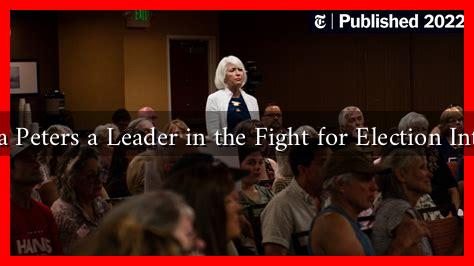-
Table of Contents
Is Tina Peters a Leader in the Fight for Election Integrity?
The topic of election integrity has become increasingly contentious in recent years, with various figures emerging as champions or critics of the electoral process. One such figure is Tina Peters, the former Clerk and Recorder of Mesa County, Colorado. Peters has gained national attention for her controversial claims regarding election fraud and her subsequent legal battles. This article explores whether Tina Peters can be considered a leader in the fight for election integrity, examining her actions, motivations, and the broader implications of her stance.
The Rise of Tina Peters
Tina Peters first came into the national spotlight following the 2020 presidential election. As a Republican official, she publicly supported claims of widespread voter fraud, which have been widely debunked by multiple sources, including the Cybersecurity and Infrastructure Security Agency (CISA).
. Peters gained notoriety for her involvement in a series of events that she claims were aimed at uncovering election irregularities.
- Allegations of Election Fraud: Peters alleged that voting machines in her county were compromised, leading to fraudulent election outcomes.
- Legal Challenges: She faced legal repercussions for her actions, including unauthorized access to voting equipment and data.
- Public Advocacy: Peters has become a vocal advocate for what she describes as “election integrity,” often speaking at rallies and events across the country.
The Controversy Surrounding Her Claims
While Peters has positioned herself as a whistleblower, her claims have been met with skepticism from election officials and experts. Numerous investigations have found no evidence to support her assertions of widespread fraud. For instance, a comprehensive report by the Brennan Center for Justice highlights that instances of voter fraud are exceedingly rare in the United States, with studies showing that the rate is between 0.0003% and 0.0025% of all votes cast.
Moreover, Peters’ actions have raised ethical questions. In 2021, she was accused of illegally accessing and copying sensitive data from voting machines, which led to a criminal investigation. Critics argue that her actions undermine public trust in the electoral process rather than bolster it.
The Support and Criticism of Peters’ Leadership
Peters has garnered a significant following among certain segments of the population who are skeptical of the electoral process. Her supporters view her as a courageous figure standing up against a corrupt system. They argue that her efforts are necessary to ensure transparency and accountability in elections.
- Supporters’ Arguments:
- Advocacy for transparency in voting processes.
- Encouragement of public discourse on election integrity.
- Mobilization of grassroots movements focused on electoral reform.
- Critics’ Arguments:
- Promotion of unfounded conspiracy theories.
- Potential to disenfranchise voters through fear and misinformation.
- Legal and ethical violations that undermine her credibility.
The Broader Implications of Peters’ Actions
The actions and rhetoric of Tina Peters have broader implications for the national conversation about election integrity. Her case exemplifies the polarization surrounding this issue, where facts and evidence often take a backseat to personal beliefs and political agendas. The rise of figures like Peters can lead to:
- Increased Mistrust: Her claims contribute to a growing mistrust in the electoral system, which can discourage voter participation.
- Legislative Changes: Some states have enacted laws aimed at increasing election security, often in response to claims similar to those made by Peters.
- Impact on Future Elections: The narrative surrounding election integrity may influence how future elections are conducted and perceived.
Conclusion
In conclusion, while Tina Peters has positioned herself as a leader in the fight for election integrity, her actions and claims have sparked significant controversy and debate. Supporters view her as a champion of transparency, while critics argue that she undermines the very democratic processes she seeks to protect. The implications of her actions extend beyond her personal narrative, affecting public trust in elections and shaping the future of electoral policies in the United States. As the conversation around election integrity continues, it is crucial to critically evaluate the motivations and consequences of those who claim to lead the charge.
For more information on election integrity and related issues, you can visit the Brennan Center for Justice.





